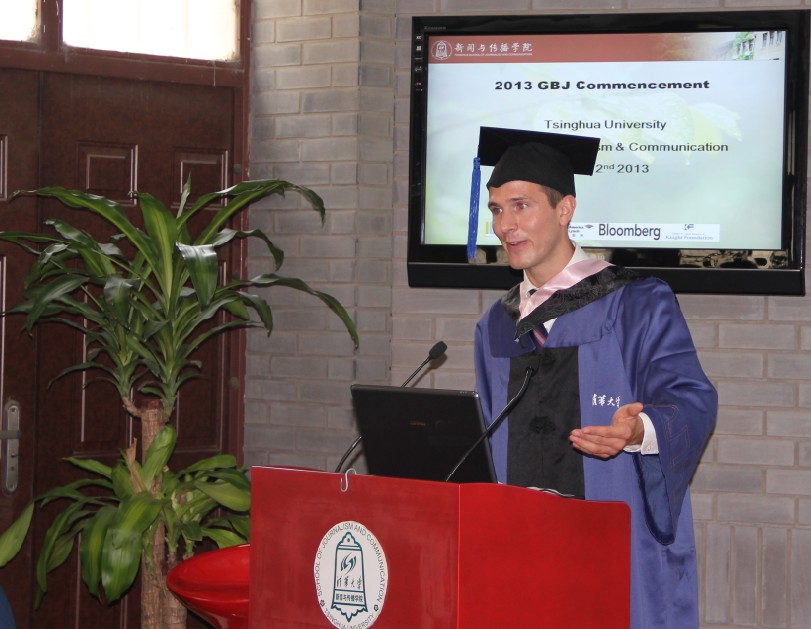Nicholas James Compton
2013 GBJ Graduates, awarded for the Excellent Student Thesis at University level during the academic year of 2011-2013
 .
.
Thank you to all the professors, administrators, university staff, and sponsors, including Bloomberg and the International Center for Journalists,who made this day possible for all of us. Special thanks to Professors Shi Anbin, Hang Min, and James Breiner for working so hard to make the Global Business Journalism Program a reality. Without your support, and your vision for this program, none of us would be here now.
Congratulations, graduates. All the papers, classes, countless PPTs and canteen meals have paid off. We are now the fifth class to graduate from Tsinghua’s Global Business Journalism Program, and probably the first, I would think, to rush to our phones after this ceremony to post pictures of ourselves in robes on Weixin.
Before I start, I should warn you… I don’t have a PPT. Not this time. Nor do I have any particularly witty, inspirational, or funny quotes, so as Professor Miller once told us to do, I’m going to keep this short, sweet, and simple. And for all you concerned journalists out there, don’t worry, there won’t be any math. Just a few numbers.
What I’d like to talk to you about are two things that I’ve battled with, and many of you might be struggling with as well. Not long ago, I was back in the U.S., and talking to a few of my friends. One is a successful accountant, and one has just finished law school. When I told them about studying journalism in China, they were dumbfounded. First, they asked why I would continue to study journalism when it’s an underpaid, underappreciated, dying dinosaur of a profession. Then they asked me why I would study journalism in CHINA of all places. Here’s what I told them, or should have:
First, journalism is not dead, and I have faith that it never will be. It cannot be. It’s true that even in the few short years we have been here we’ve witnessed an explosion of social media, blogs, and other communications platforms that allow anyone, anywhere to write, comment, and, as I’ve found - more often than not, to post pictures of their breakfasts. But with more voices, inevitably come more rumors and misinformation.
In the Boston Bombing incident a few months ago, social media platforms were flooded with rumors, half-truths, and flat-out lies – fostering false accusations, hate, and general social mayhem. This is where we come in, as journalists trained in vetting sources and sifting through mountains of rumors to report on kernels of truth. Now more than ever, our reputations as truth seekers, as whistle blowers, and as ethically sound watchdogs is what matters, and it’s what the public depends on. As we’ve found out from the social media revolution, anyone can write, but few can be trusted to report factually, as we have been trained to do as the cornerstone of good journalism.
And, nowhere, I think, is the potential for exciting, meaningful, rewarding journalism greater than in China. It’s a country where change happens faster than we can write about, and one with a deep, rich history and culture that impacts every facet of life. If we continue to take the time, and have the patience, to study this history and culture and to pick up some language along the way, the reporting opportunities here are endless. Although we might not (alright, almost certainly will not) get rich doing it, covering China now, into the future, is an amazing prospect that we all have open to us, thanks in large part to this program.
Now, I said these things to my friends, and maybe they still weren’t convinced. But, I hope that putting it this way reaffirms your commitment to journalism, or at the very least helps you to recognize its importance.
To finish up, I want to share with you an experience that has helped me to stand by journalism through periods of self-doubt and uncertainty.
A few years ago, I was working for the News Service at the Asian Games in Guangzhou. I was teaching full-time in the U.S. at the time, and was luke-warm on the idea of chasing a career in journalism. Fortuitously, as I was struggling with this, I met an old, seasoned British editor named Keith Stafford who had been working in journalism since the time my parents were in diapers, and who now runs a training school at Reuters.
The day before I left from Guangzhou, he pulled me aside, and told me that he’d noticed from my writing that I had great potential. He told me to keep writing, and that those who have a knack for journalism should stay in it, have a duty to stay in it, regardless of the pull from other opportunities. I would succeed eventually, he said, if I just kept at it. This little gesture, just a tiny nudge of support, meant a profound amount to me, and I’ve remembered it, and am thankful for it,since.
So what I want to say to you all, is that is that I believe in you and that youall have great potential. Keep writing, or at the very least, keep chasing your dreams, whatever those may be. You will succeed if you just keep at it.
I wish everyone here the very best, and look forward to following the great things you accomplish.

